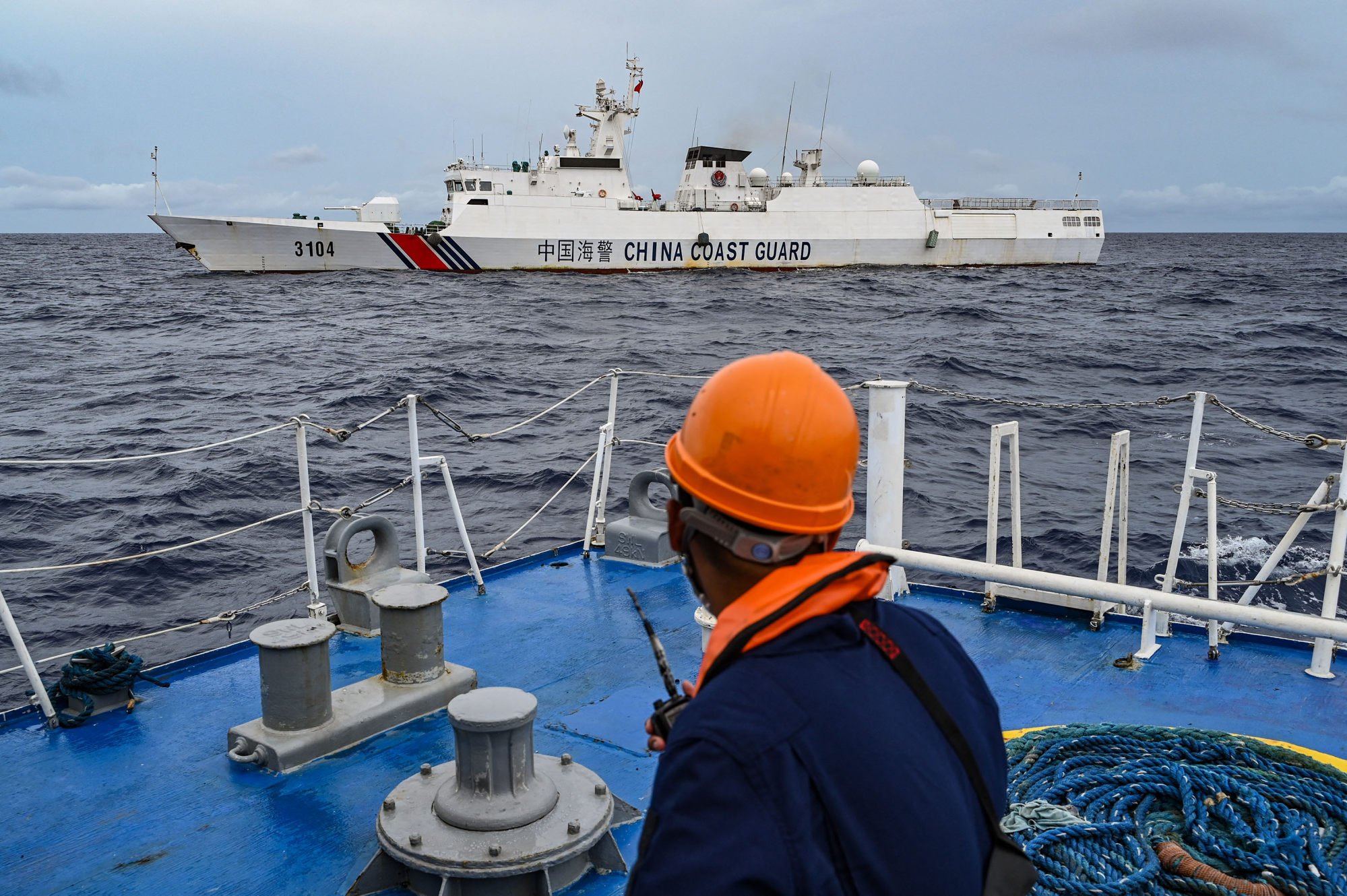Philippines-China sea dispute takes on legal edge with cyber libel suit
Top Philippine coastguard official takes action against pro-Beijing influencer for claiming that he is a paid US asset

The Philippines’ maritime dispute with China has spilled into the courts after a top coastguard official filed a cyber libel case against a pro-Beijing influencer over explosive – and, he claims, baseless – allegations that he is a paid asset of the United States.
Commodore Jay Tarriela, spokesman for Philippine Coast Guard operations in the West Philippine Sea, lodged a complaint on Friday at the Manila prosecutor’s office against Sass Rogando Sasot, a popular vlogger currently based in Beijing.
The case is unprecedented: the first known libel lawsuit arising directly from the online information war surrounding the Philippines’ increasingly fraught stand-off with China in the contested South China Sea.
According to Tarriela’s complaint, Sasot falsely accused him on social media of receiving a US$4 million “talent fee” from Washington, and of collecting bags of cash from the residence of House Speaker Martin Romualdez as payment for criticising Beijing’s actions in the West Philippine Sea – Manila’s term for the part of the South China Sea it claims as its own.
She also alleged he had been expelled from the Philippine Military Academy (PMA) for cheating.
In an interview with This Week in Asia, Tarriela said the accusations had taken a deep personal toll. “Absolutely,” he said, when asked if the claims had affected his family.
“If I won’t challenge such a post of Sasot in the social media, my children would perceive me as though I am not defending our flag, but rather that I was compensated by the US government,” he said. “Their friends might view them as the kids of someone who betrays our national interests, rather than seeing me as a patriot.”
National interest at stake
Representing Tarriela in the case is Antonio La Viña, former dean of the Ateneo de Manila University School of Government, who said he took on the case pro bono because “national interest is at stake”.
“Disinformation itself is bad,” La Viña said, “but when used to attack a patriot and to undermine a core national interest like our territorial integrity, we have to help.”
Tarriela told a congressional probe on February 18 that pro-China trolls had sought to discredit the coastguard’s transparency campaign by “attacking the messenger”. He said they amplified his past dismissal from the PMA and portrayed his Washington fellowship as evidence he was “a pro-US lapdog” and “even a CIA recruit”.
He dismissed the claims – including one that he received a US$4 million payment from the US embassy – as “absurd”, saying he remained “committed to my role in exposing Chinese aggression and raising awareness among the Filipino people”.

Sasot, who is in Beijing pursuing a doctorate in international relations under an Asean-China scholarship, posted a response to the lawsuit on Facebook.
“Under our judicial system, Commodore Jay Tarriela has all the right to file a case against anybody,” she wrote. “His legal complaint must be legally served in order for me to answer it legally. I will wait where I live, which is outside the Philippines, to receive it legally and thereby answer it legally.”
She also posted a video of Tarriela’s testimony in Congress, in which he admitted being dismissed from the PMA for violating the honour code and said, “Tarriella, this is under oath.”
Even if Sasot does not return to the country, the long arm of the law may still be able to reach her, according to Barry Gutierrez, criminal law professor at the University of the Philippines.
“There are provisions under the rules of court for extrajudicial service of summons. So I’m sure Commodore Tarriela’s lawyers will be working closely with the prosecutor’s office to choose the best mode – whether personal service abroad via a courier or something similar, or publication, both of which can be possible options,” Gutierrez told This Week in Asia.
Gutierrez said under Philippine law, Sasot could not claim that she had obtained her information from sources she could not identify.
“The protection from revealing confidential sources … still requires that the person concerned be affiliated with a mass media organisation. So I doubt an independent blogger will be covered,” he said.
Should the prosecutor find probable cause, Gutierrez said the court would issue a warrant of arrest, which would have to be served within 10 days.
“If not, a return will be made to the court. An alias warrant can, however, be reissued at any time after upon application of the prosecution – for instance, if they learn she returned to the country,” Gutierrez said.

Dr Sherwin Ona, a security and cyber defence policy expert at De La Salle University, told This Week in Asia the accusations could damage Tarriela’s reputation and affect his position as the spokesman for coastguard operations.
“If the accusation has something to do with his background, like the PMA case, then it can. It can be used to create more ammunition against him,” Ona said.
Veteran journalist and retired BusinessWorld publisher Vergel Santos is convinced that the attacks are connected to Tarriela’s spokesman role for the West Philippine Sea.
Santos voiced suspicions that since Sasot was currently in China under a state scholarship, “the logical, reasonable suspicion is that China is behind the attacks against Tarriela who is known to have taken an open and bold stand because he’s a spokesperson”.
To prove that Sasot’s accusations were motivated by “malice” – a key element in a defamation suit – Santos told This Week in Asia that “all you need to do is see who’s paying Sasot. And if the connection can be established that Sasot’s principal has something against Tarriela, that’s the end”.
Lawsuit’s implications
The lawsuit is being carefully watched by Sigla Research Centre in Manila that monitors influence operations online.
Its managing director Rossine Fallorina told This Week in Asia: “It will be interesting to see how much political will the administration demonstrates in cracking down against what they consider as bad actors [in] uncharted territory.”
He said Sasot represented “influencers beyond borders” – people based overseas “who exploit jurisdictional gaps to evade local legal accountability, and are able to operate in online platforms with impunity”.
However, Fallorina cautioned that government tools to address disinformation online risked “overstepping civil liberties”.
While the political influencers might be the ones “being hunted now”, Fallorina warned that others such as civil society advocates and journalists could also be affected in the future.